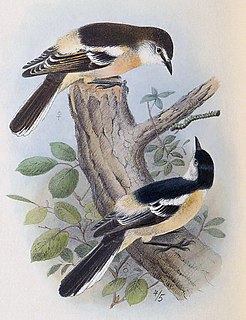 W
WThe Norfolk kākā is an extinct species of large parrot, belonging to the parrot family Nestoridae. The birds were about 38 cm long, with mostly olive-brown upperparts, (reddish-)orange cheeks and throat, straw-coloured breast, thighs, rump and lower abdomen dark orange and a prominent beak. It inhabited the rocks and treetops of Norfolk Island and adjacent Phillip Island. It was a relative of the New Zealand kākā.
 W
WThe Norfolk boobook, also known as the Norfolk Island boobook, Norfolk Island owl or Norfolk Island morepork, was a bird in the true owl family endemic to Norfolk Island, an Australian territory in the Tasman Sea between Australia and New Zealand. It is an extinct subspecies of the morepork. However, although the taxon is extinct, its genes live on in the descendants of the hybrid offspring of the last female bird, which was sighted for the last time in 1996.
 W
WThe Norfolk ground dove was a species of bird in the Columbidae, or pigeon family.
 W
WThe Norfolk pigeon or Norfolk Island pigeon, sometimes called a wood quest, was a subspecies of the New Zealand pigeon that inhabited Norfolk Island. This population probably colonized Norfolk Island from New Zealand during the Pleistocene. It became extinct around the turn of the 20th century.
 W
WThe Norfolk thrush, also known as the grey-headed blackbird or guava bird, was a bird in the thrush family endemic to Norfolk Island, an Australian territory in the Tasman Sea. It is the extinct nominate subspecies of the island thrush.
 W
WThe Norfolk triller was a small passerine bird in the cuckooshrike family, Campephagidae. It is the extinct nominate subspecies of the long-tailed triller which was endemic to Norfolk Island, an Australian territory in the Tasman Sea between Australia and New Zealand. Little is known of its biology.
 W
WThe white-chested white-eye also known as white-breasted white-eye or Norfolk white-eye is a passerine from the family Zosteropidae. It is endemic to Norfolk Island between New Caledonia and New Zealand and it is regarded as either extremely rare or possibly extinct. Since 2000 the Australian government has considered the species extinct.